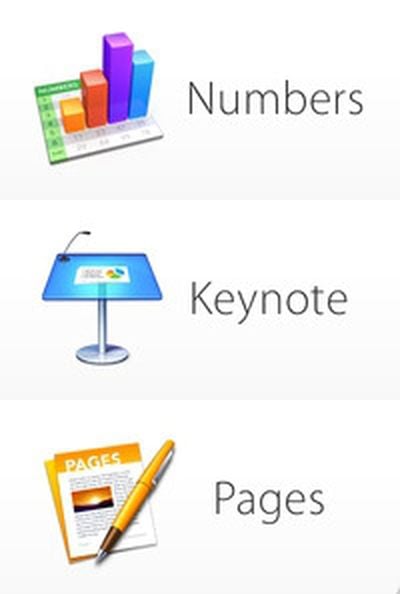 Apple today released a series of minor updates for its suite of iWork apps for both iOS and Mac, adding stability improvements and fixing bugs. iMovie for Mac was also given a minor update, adding iCloud compatibility improvements for iMovie Theater.
Apple today released a series of minor updates for its suite of iWork apps for both iOS and Mac, adding stability improvements and fixing bugs. iMovie for Mac was also given a minor update, adding iCloud compatibility improvements for iMovie Theater.
Today's minor update for the iWork apps follows a more significant update that was first released in April, adding several new features and improvements to return functionality that was removed when the new iWork apps were introduced in first September of 2013.
Apple's line of iWork apps are available for free to users who have recently purchased a new Mac or iOS device. The iWork apps for iOS are otherwise available for $9.99 from the App Store, while the Mac versions are available from the Mac App Store for $19.99. iMovie for iOS is available for $4.99, while iMovie for Mac is available for $14.99.
Pages for Mac - [Mac App Store]
Numbers for Mac - [Mac App Store]
Keynote for Mac [Mac App Store]
iMovie for Mac [Mac App Store]
Pages for iOS - [App Store]
Numbers for iOS - [App Store]
Keynote for iOS - [App Store]





















Top Rated Comments
iWork was a niche Office contender. I was so hoping that Apple would finally bring it up to date, but instead they rebuilt it with iOS in mind and took away several of the Mac features. Don't get me wrong, compatibly and consistent feature set with iOS is very nice, but Apple again played to the general consumer. They created what looks like a tablet app on the desktop. I hate the large, obnoxious sidebar that only shows "relevant" tools instead of all features like the old Inspector. But I would bend to the new UI if some of the features (even basic ones like showing two pages at the same time) were gone. AND it "updated" Pages 09 documents and lost backward compatibility. What's even sadder is that Microsoft managed to bring office to the iPad without taking away desktop features. They will build the tablet versions up instead of tearing the desktop versions down.
The fact that Apple kept the old versions in an update shows that they knew how old users would feel, that just isn't something Apple usually does. And like some one on this forum said, I don't think Apple ever intended to match its predecessor and add back new features. They only announced that intent after so much outcry. I sincerely hope Word 2014/2015 is a fluid piece of software. If it matches Word and Excel for windows I will most like leave iwork 09 behind. It was great software, but is dead now. This just the new Apple. I don't fault them for appealing to the masses, that's where they make most of their money, but Apple was a niche company for so long and now they moving to a masses only company. Killing Aperture, iWork, all the Facebook and Twitter in your face in both of their OSes, hiding the Library folder. *sigh*
Be forewarned. Their "updates" are not always upgrades.
From Day One, the entire design philosophy Microsoft has used for Word was to cram as many features into it as possible, with little regard for how important those features are to the core functions of a word processor, or for how well they were implemented. This is how you get awful concepts like the ribbon bar. At one point in the evolution of Word, these bars took up about a quarter of the screen real estate. This is the result of nobody taking charge of UI design.
I constantly see the results in Word documents. Apparently almost nobody who uses Word has the first clue about how to style paragraphs or text, for example. This is because Microsoft's consistently poor implementation of this core feature of a word processor. In fact a great many people would be better off using WordPad. They are trying to drive a semi-tractor to the supermarket.
I also write for a living. Most of my raw writing is actually done in in TextEdit, which I find to be perfect for this purpose. Final documents are completed in Pages, which until the recent downgrade, was pretty close to perfect for that purpose.
And again, I am not defending Apple's decision to reduce the feature set in Pages. Far from it. Some of the features that were most important to me, and unique to Pages, are now gone. I understand why Apple did this, but I still think it was a very poorly considered decision.
The reason? Steve Jobs' Apple (he was by now back at the helm and the 'new' iMacs were well established). The company was again focused on detail and trying to compensate for its 'tiny fish in a big pond' market share, and for the generally bemused perception of the majority. So when a Windows friend would say, "Oh, you can't get any software for those weird Mac things," there was in fact a vibrant market for third-party Mac-compatible software, and Apple's own software had to be first-rate and as Windows-friendly as it could be.
As an earlier poster on this thread commented, ClarisWorks was a great bundle of software Apple's elegant version of Microsoft Works. The word processor was clean, simple and efficient. AppleWorks followed, eventually, and it was excellent too. But by the time of Pages, Apple had bigger targets in its sights: after waking people up to Apple with iMacs, the company's iPods, iPhones and iPads were converting non-Mac people in their millions. It was a fantastic vision, but the software-functionality ball was also in the process of being dropped even despite the wizzy new OSs and software suites.
Steve is no longer there, getting people to push their respective envelopes, and while iWork should have lived up to its potential all along the way, instead here I am using iWork 09 (bugs and all). I haven't even decided just how I'm going to start using my new MacBook Air.
Where Apple has come from to where it's at now is remarkable. But I wish there was a Steve there, fixating about everything and ensuring that when something was dropped (floppies, chip architecture, aspects of hardware and software), my Mac would ultimately be the better for it.
Rose-tinted spectacles? Undoubtedly. But some truth, too.